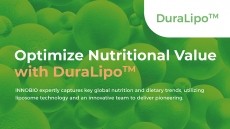Vit D and probiotic juice supports metabolic health in obesity

Greek researchers studied the effects eight weeks of supplementation of the fortified juice with 2,000 IU vitamin D and the probiotic strains Lacticaseibacillus casei Shirota and Lacticaseibacillus rhamnosus GG (108 CFU/mL) on cardiometabolic risk factors in overweight and obese adults.
“The enriched OJ led to weight loss, less energy/macronutrient consumption, improved lipid profiles and increased insulin sensitivity in those following a Westernized diet, thus indicating potential benefits for cardiometabolic risk,” the researchers reported.
The study, published in the journal Nutrients is part of the FunJuice project funded by the EU Regional Development Fund and Greek National Resources.
Innovative dietary interventions
To address obesity, studies have investigated innovative dietary interventions harnessing the combined effects of bioactive substances, including vitamin D and probiotics.
“Vitamin D3 has emerged as a focal point in enhancing insulin sensitivity, modulating lipid profiles and exerting anti-inflammatory effects [while] probiotics have been recognized for their ability to modulate the gut microbiota, systemic inflammation and lipid metabolism,” the Greek researchers wrote.
A 2020 review underscored the synergistic benefits of vitamin D and probiotic co-supplementation in ameliorating chronic disease markers and improving metabolic health more effectively than either component alone.
However, the role of fruit juice on health is controversial. Fruit juice can raise postprandial glucose levels, which has prompted recommendations to limit consumption. Despite this, evidence shows moderate daily intake doesn’t exacerbate chronic disease risks and may offer vascular, anti-inflammatory and antioxidant benefits.
Study details
The randomized, double-blind, parallel controlled trial randomly assigned 53 high-risk adults to two groups. Over eight weeks all subjects drank 250 ml of OJ (Aspis SA Hellenic Juice Industry, Argos-Korinthos, Greece) every day 30 minutes before lunchtime. One group’s OJ was vitamin D3 and probiotic enriched. Adding vitamin D and probiotics did nott change the OJ’s sensory characteristics.
Metabolic and inflammatory markers and blood pressure were measured at the beginning and end of the study.
The study used a three-day food diary to assess compliance, and vitamin D intake was estimated from food records at baseline, four weeks and eight weeks. Sun exposure was also assessed by questionnaire to evaluate how much could influence vitamin D skin synthesis.
Findings indicated that the enriched OJ led to weight loss, less energy/macronutrient consumption, improved lipid profiles and increased insulin sensitivity after eight weeks, suggesting potential benefits for cardiometabolic risk. These benefits were recorded without changes in triglycerides, inflammation, or central blood pressure.
“The results of this study underscore the potential of OJ enriched with vitamin D3 and probiotics (Lacticaseibacillus casei Shirota and Lacticaseibacillus rhamnosus GG) as a functional food that positively impacts metabolic health markers in adults at high cardiometabolic risk,” the researchers concluded, noting the potential of integrating functional foods into personalized nutrition to mitigate metabolic dysfunction.
As limitations of the study, they noted the short duration of the intervention and the lack of individual vitamin D3 or probiotic groups in the study design, which prevented evaluation of synergistic effects.
The study also observed differences between the groups for some metabolic markers, despite the randomized control methodology.
“Individual variability in response to the intervention also warrants further investigation, considering the influence of factors such as the gut microbiota composition,” the researchers wrote.
Journal: Nutrients
doi: 10.3390/nu16091331
“Two-Month Consumption of Orange Juice Enriched with Vitamin D3 and Probiotics Decreases Body Weight, Insulin Resistance, Blood Lipids, and Arterial Blood Pressure in High-Cardiometabolic-Risk Patients on a Westernized Type Diet: Results from a Randomized Clinical Trial.”
Authors: E. Papakonstantinou et al.











